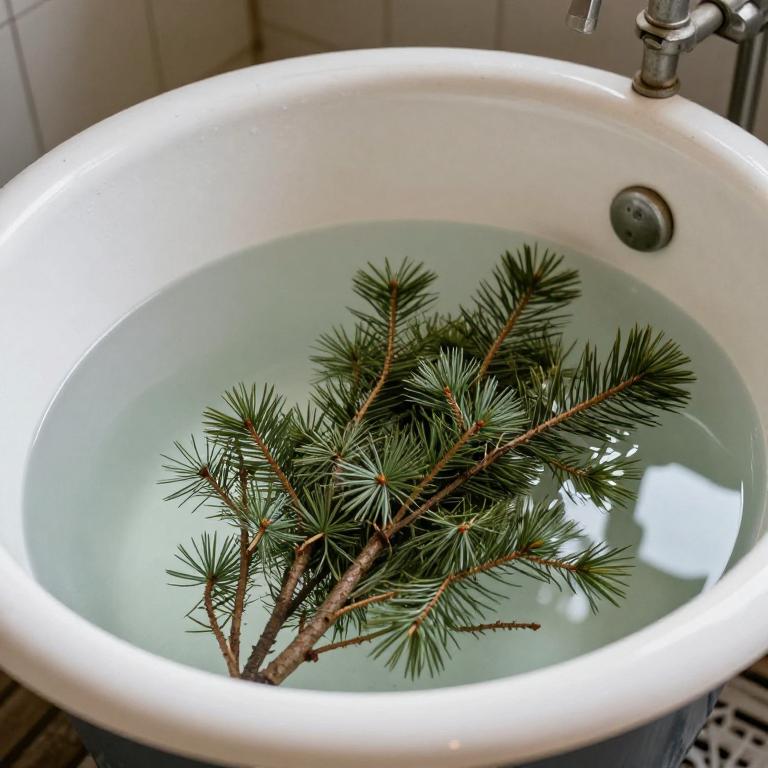10 Best Herbal Baths For Dry Cough

Herbal baths can be a soothing and natural remedy for alleviating symptoms of a dry cough by promoting relaxation and easing respiratory congestion.
Certain herbs such as eucalyptus, lavender, and chamomile are commonly used in baths due to their anti-inflammatory and decongestant properties. Adding these herbs to warm water can help open up the airways and reduce irritation in the throat. The steam from the bath may also help loosen mucus and provide relief from persistent coughing.
While herbal baths are not a cure for underlying causes of a dry cough, they can offer symptomatic relief and support the body's natural healing process.
Table of Contents
- 1. Eucalyptus (Eucalyptus globulus)
- 2. Thyme (Thymus vulgaris)
- 3. Peppermint (Mentha piperita)
- 4. English lavender (Lavandula angustifolia)
- 5. Salvia (Salvia officinalis)
- 6. Scots pine (Pinus sylvestris)
- 7. Rosemary (Rosmarinus officinalis)
- 8. Ginger (Zingiber officinale)
- 9. Chamomile (Matricaria chamomilla)
- 10. Black elderberry (Sambucus nigra)
1. Eucalyptus (Eucalyptus globulus)

Eucalyptus globulus, commonly known as the Australian eucalyptus, is often used in herbal baths to alleviate symptoms of a dry cough.
The essential oils from this plant contain compounds like cineole and terpenes, which have antimicrobial and anti-inflammatory properties. When added to warm water, these oils can help open up the airways and reduce throat irritation, providing relief from a persistent dry cough. A gentle eucalyptus globulus herbal bath can also promote relaxation and ease respiratory discomfort.
However, it is important to dilute the essential oils properly to avoid skin irritation and consult with a healthcare professional if symptoms persist.
2. Thyme (Thymus vulgaris)

Thymus vulgaris, commonly known as thyme, has been traditionally used in herbal baths to alleviate symptoms of dry cough due to its potent antimicrobial and expectorant properties.
When infused into warm water, thyme essential oils or dried leaves can create a soothing bath that helps reduce inflammation in the respiratory tract and ease breathing. The aromatic compounds in thyme, such as thymol, may help open up airways and provide a calming effect on the throat and lungs. Regular use of thyme herbal baths can support the body's natural healing process and offer relief from persistent dry cough.
However, it is advisable to consult a healthcare professional before using thyme baths, especially for individuals with sensitive skin or existing medical conditions.
3. Peppermint (Mentha piperita)

Mentha piperita, commonly known as peppermint, has been traditionally used in herbal baths to alleviate symptoms of dry cough by promoting respiratory comfort and reducing inflammation.
The essential oils in peppermint contain menthol, which can help soothe irritated airways and ease the sensation of coughing. When added to warm water for a bath, the aromatic compounds are absorbed through the skin, offering a calming and decongesting effect. This method is particularly beneficial for those seeking a natural, non-invasive approach to managing persistent dry cough.
Regular use of peppermint herbal baths may also help improve overall respiratory function and provide relief from associated symptoms like chest tightness and throat irritation.
4. English lavender (Lavandula angustifolia)

Lavandula angustifolia, commonly known as English lavender, has been traditionally used in herbal baths to soothe respiratory discomfort, including dry cough.
The calming essential oils in lavender, such as linalool and lavanduline, possess anti-inflammatory and antispasmodic properties that may help reduce irritation in the respiratory tract. When added to a warm bath, lavender can promote relaxation and ease the tension that often accompanies persistent coughing. The steam from the bath can also help open up airways and ease breathing, offering a natural remedy for those seeking relief without medication.
Incorporating lavender into a herbal bath can be a soothing and aromatic way to support respiratory health and promote overall well-being.
5. Salvia (Salvia officinalis)

Salvia officinalis, commonly known as sage, has been traditionally used in herbal baths to alleviate symptoms of a dry cough.
The aromatic compounds in sage leaves, such as thujone and camphor, are believed to have soothing and antispasmodic properties that may help reduce throat irritation and ease coughing fits. When infused into bath water, sage can promote relaxation and ease respiratory discomfort through its calming effects on the nervous system. This practice is often combined with steam therapy to enhance the inhalation of sage's medicinal vapors, further supporting respiratory health.
While herbal baths can offer symptomatic relief, they should complement, not replace, professional medical advice for persistent or severe dry coughs.
6. Scots pine (Pinus sylvestris)

Pinus sylvestris, commonly known as Scots pine, has been traditionally used in herbal baths to alleviate symptoms of a dry cough.
The essential oils extracted from the needles of this conifer contain compounds like alpha-pinene and camphor, which possess anti-inflammatory and expectorant properties. When infused into bath water, these oils can help soothe irritated airways and reduce coughing fits through their calming and aromatic effects. The warmth of the bath also promotes relaxation, which can ease respiratory discomfort and improve overall breathing.
While not a substitute for medical treatment, pine baths may offer a natural, complementary approach to managing persistent dry cough.
7. Rosemary (Rosmarinus officinalis)

Rosmarinus officinalis, commonly known as rosemary, has been traditionally used in herbal baths to alleviate symptoms of dry cough by promoting respiratory comfort and reducing throat irritation.
The essential oils in rosemary, particularly cineole and camphor, possess anti-inflammatory and decongestant properties that can soothe the respiratory tract when absorbed through the skin during a bath. Incorporating rosemary into a warm bath allows the body to absorb its therapeutic compounds, helping to ease chest congestion and ease breathing. This natural remedy is especially beneficial for those seeking a gentle, non-invasive approach to managing persistent dry cough.
When used regularly, rosemary herbal baths may contribute to overall respiratory wellness and provide a calming, aromatic experience.
8. Ginger (Zingiber officinale)

Zingiber officinale, commonly known as ginger, has been traditionally used in herbal baths to alleviate symptoms of dry cough by promoting respiratory comfort and reducing inflammation.
The warming properties of ginger help to soothe the throat and ease bronchial irritation, making it a natural remedy for persistent dry coughs. To prepare a ginger herbal bath, fresh or dried ginger root is boiled in water, and the resulting infusion is added to a warm bath, allowing the steam to penetrate the respiratory system. This method is believed to enhance circulation and clear mucus, offering a holistic approach to respiratory wellness.
While not a substitute for medical treatment, ginger baths can serve as a complementary therapy to support healing and provide relief from dry cough symptoms.
9. Chamomile (Matricaria chamomilla)

Matricaria chamomilla, commonly known as chamomile, has been traditionally used for its soothing and anti-inflammatory properties, making it a popular choice for herbal baths aimed at alleviating dry cough.
When infused into bath water, chamomile can help relax the respiratory system and reduce irritation in the throat, providing relief from persistent dry cough symptoms. The warm water combined with the calming aroma of chamomile can also ease stress and promote better breathing, which is beneficial for those suffering from chronic coughing. Additionally, chamomile baths may help reduce inflammation in the airways, supporting overall respiratory health.
For best results, it is recommended to use a chamomile tea bag or essential oil in warm water and soak for at least 15 to 20 minutes.
10. Black elderberry (Sambucus nigra)

Sambucus nigra, commonly known as European elderberry, has been traditionally used in herbal baths to alleviate symptoms of dry cough by promoting respiratory health and reducing inflammation.
The infusion of elderberry flowers and berries in bath water is believed to help soothe irritated airways and ease breathing, making it a natural remedy for those suffering from persistent dry cough. This herbal bath works by creating a calming and humid environment that may help loosen mucus and reduce throat irritation. It is often recommended as a complementary therapy alongside other natural remedies for cough relief.
While generally safe, it is important to consult a healthcare professional before using elderberry baths, especially for individuals with allergies or underlying health conditions.